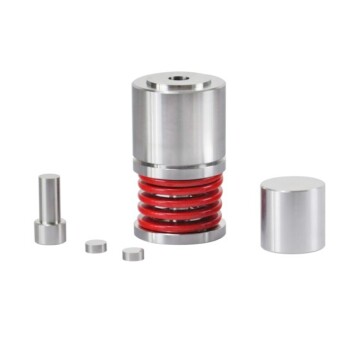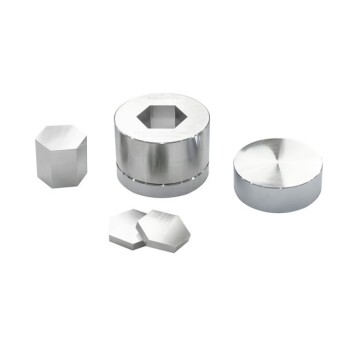At their core, laboratory hydraulic presses are used to test and compact a remarkably wide range of materials, most notably powders, polymers, ceramics, and metals. These instruments are fundamental in both research and industrial settings for preparing standardized samples and simulating manufacturing conditions to test material properties before large-scale production.
The true value of a laboratory hydraulic press isn't just its ability to apply force. It is a precision instrument for transforming raw or mixed materials into uniform, dense samples, which is the mandatory first step for obtaining reliable and repeatable analytical data.

The Purpose: From Raw Material to Standardized Sample
A hydraulic press is rarely the final step in a process. Its primary function is to create a testable specimen from a substance that is otherwise difficult to analyze in its raw form.
Preparing Samples for Spectroscopic Analysis
Many advanced analytical techniques, such as X-ray fluorescence (XRF) spectroscopy, require the sample to be in a solid, flat, and homogenous form.
A hydraulic press is used to compress powder mixtures into uniform pellets. This standardized shape ensures that the X-ray beam interacts with the material consistently, leading to accurate and repeatable measurements of its elemental composition.
Simulating Manufacturing Processes
For materials like rubber, plastic, and laminates, a lab press can simulate the heat and pressure of industrial molding or lamination processes on a small, controlled scale.
This allows technicians to create test coupons or substances to assess properties like blocking resistance (unwanted adhesion between layers) and overall performance, identifying potential issues before committing to a full production run.
Creating Dense Forms for Material Science
In fields like metallurgy and ceramics, researchers use presses to compact metal or ceramic powders into "green bodies."
These dense forms can then be studied for their compaction behavior or subjected to further processes like sintering to test the final properties of the engineered material.
A Breakdown of Common Material Categories
The versatility of hydraulic presses means they are used across many scientific disciplines, each focusing on different materials.
Powders and Granules
This is the broadest and most common category. The press compacts loose powders into solid forms for analysis or further processing. This is critical in pharmaceuticals, geology, metallurgy, and environmental science.
Polymers and Composites
Rubber and plastics are frequently molded into specific shapes for quality control testing. This helps verify that a batch of raw polymer will behave as expected during manufacturing.
Ceramics and Metals
High-performance materials used in demanding applications require rigorous testing. Presses are used to prepare samples of advanced ceramics and metal alloys, which may eventually be used in components like medical implants or engine parts, where material reliability is non-negotiable.
Understanding the Practical Considerations
While powerful, a laboratory press is a specific tool with a defined scope. Understanding its purpose and limitations is key to using it effectively.
Lab Scale vs. Industrial Production
A laboratory press is designed for sample preparation and testing, not mass production. While the principles are the same, an industrial press used to forge a turbine blade is a vastly different machine in scale, automation, and function. The lab press provides the data that informs the industrial process.
Ensuring Operator and Equipment Safety
These presses generate immense force. Modern units are equipped with critical safety features like pressure relief valves to prevent overloading the system and safety shields or interlocking systems to protect the operator during compaction. Proper training and adherence to safety protocols are essential.
Making the Right Choice for Your Goal
The decision to use a hydraulic press depends entirely on what you need to learn from your material.
- If your primary focus is sample preparation for analysis (e.g., XRF): A press is indispensable for creating the uniform, dense pellets required for accurate compositional data.
- If your primary focus is quality control for polymers or laminates: Use a press to cost-effectively simulate manufacturing conditions and test the physical properties of new material batches.
- If your primary focus is materials research (ceramics, metals, powders): A press is a fundamental tool for creating consolidated samples to study compaction behavior and mechanical strength.
Ultimately, a laboratory hydraulic press provides the controlled force needed to turn a raw substance into a source of reliable data.
Summary Table:
| Material Category | Common Applications | Key Benefits |
|---|---|---|
| Powders and Granules | Pharmaceuticals, geology, metallurgy, environmental science | Uniform pellets for accurate analysis (e.g., XRF) |
| Polymers and Composites | Rubber, plastics, laminates | Simulates manufacturing for quality control |
| Ceramics and Metals | Advanced ceramics, metal alloys | Creates dense forms for strength testing |
Ready to enhance your lab's efficiency with reliable sample preparation? KINTEK specializes in lab press machines, including automatic lab presses, isostatic presses, and heated lab presses, designed to serve your laboratory needs for testing and compacting powders, polymers, ceramics, and metals. Our equipment ensures precise, uniform results for accurate material analysis and quality control. Contact us today to discuss how our solutions can benefit your research and industrial applications!
Visual Guide

Related Products
- Laboratory Hydraulic Press 2T Lab Pellet Press for KBR FTIR
- Laboratory Hydraulic Press Lab Pellet Press Button Battery Press
- Manual Heated Hydraulic Lab Press with Integrated Hot Plates Hydraulic Press Machine
- Automatic Laboratory Hydraulic Press Lab Pellet Press Machine
- Manual Laboratory Hydraulic Press Lab Pellet Press
People Also Ask
- What are some laboratory applications of hydraulic presses? Boost Precision in Sample Prep and Testing
- How are hydraulic presses used in spectroscopy and compositional determination? Enhance Accuracy in FTIR and XRF Analysis
- How is a laboratory hydraulic press used for Tb(III)-Organic Framework FT-IR samples? Expert Pellet Pressing Guide
- What is the role of a hydraulic press in KBr pellet preparation for FTIR? Achieve High-Resolution Chemical Insights
- Why is sample uniformity critical when using a laboratory hydraulic press for humic acid KBr pellets? Achieve FTIR Accuracy



















